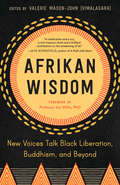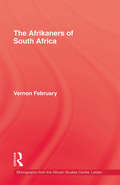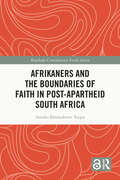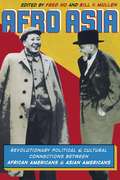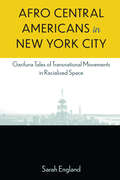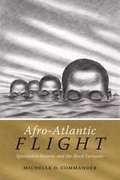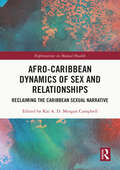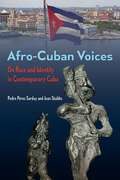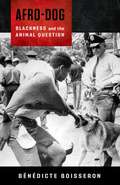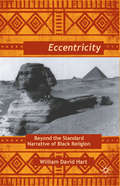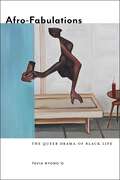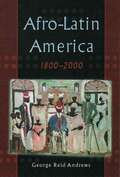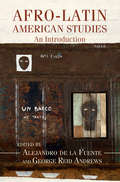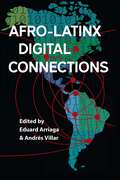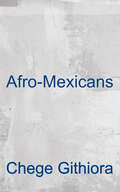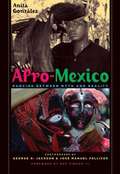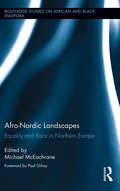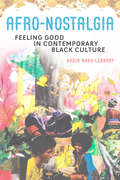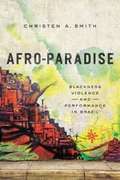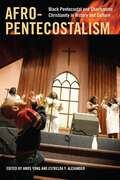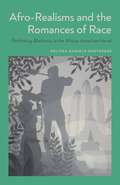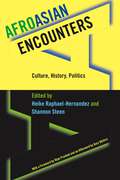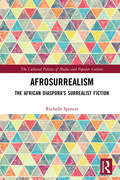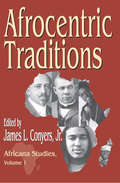- Table View
- List View
Afrikan Wisdom: New Voices Talk Black Liberation, Buddhism, and Beyond
by Valerie Mason-JohnA spiritual, political, and interdisciplinary anthology of wisdom stories from Black liberation leaders and teachers.Afrikan Wisdom represents an intersectional, cross-pollinated exploration of Black life--past, present, and future. Award-winning author and editor Valerie Mason-John (Vimalasara)'s collection of 34 essays--written by an eclectic and inspirational group of Black thought leaders and teachers--reflects on the unique and multilayered experience of being Black in the world today. This anthology instills in readers the knowledge, awareness, validation, and spiritual tools necessary to nurture both individual and collective liberation. It is both an inspiration and a motivation for Black readers, as well as anyone else interested in reading about emerging spiritual voices. Topics include: • African and Afro-Diasporan cultures, histories, spiritualities, art, music, and literature • Black radical traditions of liberation and consciousness • Anticolonialism and antislavery • Buddhist philosophy • Social and environmental justice • The prison industrial complex and mass incarceration • (Kemetic) yoga, healing, and mindfulness • Intersections with Indigenous cultures • Addiction and recovery • Transgenerational trauma
Afrikaners Of South Africa
by FebruaryFirst Published in 1991. Routledge is an imprint of Taylor & Francis, an informa company.
Afrikaners and the Boundaries of Faith in Post-Apartheid South Africa (Routledge Contemporary South Africa)
by Annika Björnsdotter TeppoThis book examines the shifting moral and spiritual lives of white Afrikaners in South Africa after apartheid. The end of South Africa’s apartheid system of racial and spatial segregation sparked wide-reaching social change as social, cultural, spatial and racial boundaries were transgressed and transformed. This book investigates how Afrikaners have mediated the country’s shifting boundaries within the realm of religion. For instance, one in every three Afrikaners used these new freedoms to leave the traditional Dutch Reformed Church (NGK), often for an entirely new religious affiliation within the Pentecostal or Charismatic churches, or New Religious Movements such as Wiccan neopaganism. Based on long-term ethnographic fieldwork in the Western Cape area, the book investigates what spiritual life after racial totalitarianism means for the members of the ethnic group that constructed and maintained that very totalitarianism. Ultimately, the book asks how these new Afrikaner religious practices contribute to social solidarity and integration in a persistently segregated society, and what they can tell us about racial relations in the country today. This book will be of interest to scholars of religious studies, social and cultural anthropology and African studies.
Afro Asia: Revolutionary Political and Cultural Connetions Between African Americans and Asian Americans
by Fred Ho Bill V. MullenWith contributions from activists, artists, and scholars, Afro Asia is a groundbreaking collection of writing on the historical alliances, cultural connections, and shared political strategies linking African Americans and Asian Americans. Bringing together autobiography, poetry, scholarly criticism, and other genres, this volume represents an activist vanguard in the cultural struggle against oppression. Afro Asia opens with analyses of historical connections between people of African and of Asian descent. An account of nineteenth-century Chinese laborers who fought against slavery and colonialism in Cuba appears alongside an exploration of African Americans' reactions to and experiences of the Korean "conflict. " Contributors examine the fertile period of Afro-Asian exchange that began around the time of the 1955 Bandung Conference, the first meeting of leaders from Asian and African nations in the postcolonial era. One assesses the relationship of two important 1960s Asian American activists to Malcolm X and the Black Panthers. Mao Ze Dong's 1963 and 1968 statements in support of black liberation are juxtaposed with an overview of the influence of Maoism on African American leftists. Turning to the arts, Ishmael Reed provides a brief account of how he met and helped several Asian American writers. A Vietnamese American spoken-word artist describes the impact of black hip-hop culture on working-class urban Asian American youth. Fred Ho interviews Bill Cole, an African American jazz musician who plays Asian double-reed instruments. This pioneering collection closes with an array of creative writing, including poetry, memoir, and a dialogue about identity and friendship that two writers, one Japanese American and the other African American, have performed around the United States. Contributors: Betsy Esch, Diane C. Fujino, royal hartigan, Kim Hewitt, Cheryl Higashida, Fred Ho, Everett Hoagland, Robin D. G. Kelley, Bill V. Mullen, David Mura, Ishle Park, Alexs Pate, Thien-bao Thuc Phi, Ishmael Reed, Kalamu Ya Salaam, Maya Almachar Santos, JoYin C. Shih, Ron Wheeler, Daniel Widener, Lisa Yun
Afro Central Americans in New York City: Garifuna Tales of Transnational Movements in Racialized Space
by Sarah EnglandDescended from African maroons and the Island Carib on colonial St. Vincent, and later exiled to Honduras, the Garifuna way of life combines elements of African, Island Carib, and colonial European culture. Beginning in the 1940s, this cultural matrix became even more complex as Garifuna began migrating to the United States, forming communities in the cities of New York, New Orleans, and Los Angeles. Moving between a village on the Caribbean coast of Honduras and the New York City neighborhoods of the South Bronx and Harlem, England traces the daily lives, experiences, and grassroots organizing of the Garifuna.Concentrating on how family life, community life, and grassroots activism are carried out in two countries simultaneously as Garifuna move back and forth, England also examines the relationship between the Garifuna and Honduran national society and discusses much of the recent social activism organized to protect Garifuna coastal villages from being expropriated by the tourism and agro-export industries.Based on two years of fieldwork in Honduras and New York, her study examines not only how this transnational system works but also the impact that the complex racial and ethnic identity of the Garifuna have on the surrounding societies. As a people who can claim to be Black, Indigenous, and Latino, the Garifuna have a complex relationship not only with U.S. and Honduran societies but also with the international community of nongovernmental organizations that advocate for the rights of Indigenous peoples and blacks.Publication of the paperback edition made possible by a Sustaining the Humanities through the American Rescue Plan grant from the National Endowment for the Humanities.
Afro-Atlantic Flight: Speculative Returns and the Black Fantastic
by Michelle D. CommanderIn Afro-Atlantic Flight Michelle D. Commander traces how post-civil rights Black American artists, intellectuals, and travelers envision literal and figurative flight back to Africa as a means by which to heal the dispossession caused by the slave trade. Through ethnographic, historical, literary, and filmic analyses, Commander shows the ways that cultural producers such as Octavia Butler, Thomas Allen Harris, and Saidiya Hartman engage with speculative thought about slavery, the spiritual realm, and Africa, thereby structuring the imaginary that propels future return flights. She goes on to examine Black Americans’ cultural heritage tourism in and migration to Ghana; Bahia, Brazil; and various sites of slavery in the US South to interrogate the ways that a cadre of actors produces “Africa” and contests master narratives. Compellingly, these material flights do not always satisfy Black Americans’ individualistic desires for homecoming and liberation, leading Commander to focus on the revolutionary possibilities inherent in psychic speculative returns and to argue for the development of a Pan-Africanist stance that works to more effectively address the contemporary resonances of slavery that exist across the Afro-Atlantic.
Afro-Caribbean Dynamics of Sex and Relationships: Reclaiming the Caribbean Sexual Narrative (Explorations in Mental Health)
by Morgan Campbell, Kai A. D.Afro-Caribbean Dynamics of Sex and Relationships: Reclaiming the Caribbean Sexual Narrative examines the complexities of sexuality and relationships in the Caribbean, shaped by colonial legacies, cultural norms, and evolving gender roles.Through seven original research studies, it explores a wide range of topics related to sexuality and intimate relationships, including body image and sexual satisfaction, sexual socialization and communication, perceptions of unconventional relationships, the psychological impact of adverse childhood experiences on intimate relationships, family structure’s influence on sexual identity, sexual decision-making among Caribbean youth, and the intersections of mental health, trauma, and intimacy. This book challenges Eurocentric narratives, offering a culturally grounded framework for understanding Afro-Caribbean sexuality.Bridging psychology, sociology, and history, it is essential reading for scholars, researchers, and academics in gender, sexuality, Caribbean studies, and postcolonial mental health.
Afro-Cuban Voices: On Race and Identity in Contemporary Cuba (Contemporary Cuba)
by Jean Stubbs Pedro Pérez SarduyFrom the forewords: "At a time when Cuba is undergoing immense economic and social changes, race becomes a kind of cultural litmus test for the national identity. . . . This anthology illustrates fully that it is possible to be both revolutionary and black in Cuba."—Manning Marable, Columbia University "The authors of Afro-Cuban Voices, also key actors in the new, unfolding dialogue about race in Cuba, make a seminal contribution through a forthright critique of ‘racial blind spots’ in official history and present-day racial discrimination."—James Early, director of cultural studies and communication, Smithsonian Institution From the series editor: "A courageous attempt to deal head-on with the issue of race in Cuba today. . . . Pérez Sarduy and Stubbs [seek to] put a human face on this debate, and do so well. The book will be received with relief by some and with frustration by others. Controversial it will undoubtedly be, since—as with most things Cuban—strong emotions are a given assumption. It will be an admirable beginning for the series and, it is hoped, will spark a much-needed debate in the United States on many aspects of the ‘Cuban question.’ It is about time."—John M. Kirk Based on the vivid firsthand testimony of prominent Afro-Cubans who live in Cuba, this book of interviews looks at ways that race affects daily life on the island. While celebrating their racial and national identity, the collected voices express an urgent need to end the silences and distortions of history in both pre- and postrevolutionary Cuba. The 14 people interviewed—of different generations and from different geographic areas of Cuba—come from the arts, the media, industry, academia, and medicine. They include a doctor who calls for joint U.S.-Cuban studies on high blood pressure and a craftsman who makes the batá drums used in Yoruba worship ceremonies. All responded to four controversial questions: What is it like to be black in Cuba? How has the revolution made a difference? To what extent is that difference true today? What can be done? Exposing the contradictions of both racial stereotyping and cultural assimilation, their eloquent answers make the case that the issue of race in Cuba, no matter how hard to define, will not be ignored. A volume in the series Contemporary Cuba, edited by John M. Kirk
Afro-Dog: Blackness and the Animal Question
by Bénédicte BoisseronThe animal-rights organization PETA asked “Are Animals the New Slaves?” in a controversial 2005 fundraising campaign; that same year, after the Humane Society rescued pets in the aftermath of Hurricane Katrina while black residents were neglected, some declared that white America cares more about pets than black people. These are but two recent examples of a centuries-long history in which black life has been pitted against animal life. Does comparing human and animal suffering trivialize black pain, or might the intersections of racialization and animalization shed light on interlinked forms of oppression?In Afro-Dog, Bénédicte Boisseron investigates the relationship between race and the animal in the history and culture of the Americas and the black Atlantic, exposing a hegemonic system that compulsively links and opposes blackness and animality to measure the value of life. She analyzes the association between black civil disobedience and canine repression, a history that spans the era of slavery through the use of police dogs against protesters during the civil rights movement of the 1960s to today in places like Ferguson, Missouri. She also traces the lineage of blackness and the animal in Caribbean literature and struggles over minorities’ right to pet ownership alongside nuanced readings of Derrida and other French theorists. Drawing on recent debates on black lives and animal welfare, Afro-Dog reframes the fast-growing interest in human–animal relationships by positioning blackness as a focus of animal inquiry, opening new possibilities for animal studies and black studies to think side by side.
Afro-Eccentricity: Beyond the Standard Narrative of Black Religion
by William David HartAfro-Eccentricity explores three overlapping stories of Black Religion: the Soul, Black Church, and Ancestor Narratives. Hart contends that these narratives dominate most accounts of Black Religion that, collectively, he calls the "Standard Narrative of Black Religion. "
Afro-Fabulations: The Queer Drama of Black Life (Sexual Cultures #14)
by Tavia Nyong'oWinner, 2019 Barnard Hewitt Award for Outstanding Research in Theatre History, given by the American Society for Theatre ResearchHonorable Mention, 2021 Errol Hill Award, given by the American Society for Theatre ResearchArgues for a conception of black cultural life that exceeds post-blackness and conditions of loss In Afro-Fabulations: The Queer Drama of Black Life, cultural critic and historian Tavia Nyong’o surveys the conditions of contemporary black artistic production in the era of post-blackness. Moving fluidly between the insurgent art of the 1960’s and the intersectional activism of the present day, Afro-Fabulations challenges genealogies of blackness that ignore its creative capacity to exceed conditions of traumatic loss, social death, and archival erasure.If black survival in an anti-black world often feels like a race against time, Afro-Fabulations looks to the modes of memory and imagination through which a queer and black polytemporality is invented and sustained. Moving past the antirelational debates in queer theory, Nyong’o posits queerness as “angular sociality,” drawing upon queer of color critique in order to name the gate and rhythm of black social life as it moves in and out of step with itself. He takes up a broad range of sites of analysis, from speculative fiction to performance art, from artificial intelligence to Blaxploitation cinema. Reading the archive of violence and trauma against the grain, Afro-Fabulations summons the poetic powers of queer world-making that have always been immanent to the fight and play of black life.
Afro-Latin America, 1800-2000
by George Reid AndrewsWhile the rise and abolition of slavery and ongoing race relations are central themes of the history of the United States, the African diaspora actually had a far greater impact on Latin and Central America. More than ten times as many Africans came to Spanish and Portuguese America as the United States. <p><p>In this, the first history of the African diaspora in Latin America from emancipation to the present, George Reid Andrews deftly synthesizes the history of people of African descent in every Latin American country from Mexico and the Caribbean to Argentina. He examines how African peooples and their descendants made their way from slavery to freedom and how they helped shape and responded to political, economic, and cultural changes in their societies. Individually and collectively they pursued the goals of freedom, equality, and citizenship through military service, political parties, civic organizations, labor unions, religious activity, and other avenues. <p><p>Spanning two centuries, this tour de force should be read by anyone interested in Latin American history, the history of slavery, and the African diaspora, as well as the future of Latin America.
Afro-Latin American Studies: An Introduction (Afro-latin America )
by George Reid Andrews Alejandro De La FuenteAlejandro de la Fuente and George Reid Andrews offer the first systematic, book-length survey of humanities and social science scholarship on the exciting field of Afro-Latin American studies. Organized by topic, these essays synthesize and present the current state of knowledge on a broad variety of topics, including Afro-Latin American music, religions, literature, art history, political thought, social movements, legal history, environmental history, and ideologies of racial inclusion.<P><P> This volume connects the region's long history of slavery to the major political, social, cultural, and economic developments of the last two centuries. Written by leading scholars in each of those topics, the volume provides an introduction to the field of Afro-Latin American studies that is not available from any other source and reflects the disciplinary and thematic richness of this emerging field.<P> Presents systematic and synthetic overviews of recent scholarship on topics of major importance in the field of Afro-Latin American studies, for example Afro-Latin American religions, Afro-Latin American political movements, and Afro-Latin American music. Covers a broad range of topics, embracing most of the humanities and social sciences.<P> Serves as the authoritative introduction for Afro-Latin American history, covering the period from 1500 to the present.<P>
Afro-Latinx Digital Connections (Reframing Media, Technology, and Culture in Latin/o America)
by Eduard Arriaga Andrés VillarHow Black Latinx communities are using digital technology to achieve visibility and social justice This volume presents examples of how digital technologies are being used by people of African descent in South America and the Caribbean, a topic that has been overlooked within the field of digital humanities. These case studies show that in the last few decades, Black Latinx communities have been making themselves visible and asserting long-standing claims and rights through digital tools and platforms, which have been essential for enacting discussions and creating new connections between diverse groups. Afro-Latinx Digital Connections includes both research articles and interviews with practitioners who are working to create opportunities for marginalized communities. Projects discussed in this volume range from an Afrodescendant digital archive in Argentina, blog networks in Cuba, an NGO dedicated to democratizing technology in Brazilian favelas, and the recruitment of digital media to fight racism in Peru. Contributors demonstrate that these tools need not be state of the art to be effective and that they are often most useful when employed to sustain a resilience that is deep and historically grounded. Digital connections are shown here as a means to achieve social justice and to create complex self-representations that challenge racist images of Afrodescendant peoples and monolithic conceptions of humanity. This volume expands the scope of digital humanities and challenges views of the field as a predominantly white discipline. Contributors: Sandra AbdAllah-Álvarez | Adebayo Adegbembo | Maya Anderson-González | Eduard Arriaga | Silvana Bahia | Yvonne Captain | Monica Carrillo | Yancy Castillo | Alí Majul | Maria Cecilia Martino | Andrés Villar A volume in the series Reframing Media, Technology, and Culture in Latin/o America, edited by Héctor Fernández L’Hoeste and Juan Carlos Rodríguez
Afro-Mexicans: Discourse of Race and Identity on the African Diaspora
by Chege GithoriaMy fascinating journey among Afro-Mexicans began when I was a student in Mexico City. My personal background had shaped in me a consciousness about African people dispersed in all continents, but because of the language barrier, my conceptualization of their journey of migration and survival, linguistic and sociocultural continuities was limited to African Diaspora experiences of Anglo-North America and the Caribbean, perhaps one or two translations from the French Caribbean experience, but nothing of the Hispanic Diaspora. This pervasive effect of the linguistic spheres carved by the different European powers in their colonization of Africa, Asia, and the Americas must, I con¬cluded, be appreciated in full.
Afro-Mexico: Dancing Between Myth and Reality
by Anita GonzálezWhile Africans and their descendants have lived in Mexico for centuries, many Afro-Mexicans do not consider themselves to be either black or African. For almost a century, Mexico has promoted an ideal of its citizens as having a combination of indigenous and European ancestry. This obscures the presence of African, Asian, and other populations that have contributed to the growth of the nation. However, performance studies--of dance, music, and theatrical events--reveal the influence of African people and their cultural productions on Mexican society. In this work, Anita Gonzalez articulates African ethnicity and artistry within the broader panorama of Mexican culture by featuring dance events that are performed either by Afro-Mexicans or by other ethnic Mexican groups about Afro-Mexicans. She illustrates how dance reflects upon social histories and relationships and documents how residents of some sectors of Mexico construct their histories through performance. Festival dances and, sometimes, professional staged dances point to a continuing negotiation among Native American, Spanish, African, and other ethnic identities within the evolving nation of Mexico. These performances embody the mobile histories of ethnic encounters because each dance includes a spectrum of characters based upon local situations and historical memories.
Afro-Nordic Landscapes: Equality and Race in Northern Europe (Routledge Studies on African and Black Diaspora)
by Michael McEachraneAfro-Nordic Landscapes: Equality and Race in Northern Europe challenges a view of Nordic societies as homogenously white, and as human rights champions that are so progressive that even the concept of race is deemed irrelevant to their societies. The book places African Diasporas, race and legacies of imperialism squarely in a Nordic context. How has a nation as peripheral as Iceland been shaped by an identity of being white? How do Black Norwegians challenge racially conscribed views of Norwegian nationhood? What does the history of jazz in Denmark say about the relation between its national identity and race? What is it like to be a mixed-race black Swedish woman? How have African Diasporans in Finland navigated issues of race and belonging? And what does the widespread denial of everyday racism in Nordic societies mean to Afro-Nordics? This text is a must read for anyone interested in issues of race in the Nordic region and Europe writ large. As Paul Gilroy writes in his foreword, it is a book that "should be studied with care and profit inside the Nordic countries and also outside them by the broader international readership that has been established around the study of racism and 'critical race theory'."
Afro-Nostalgia: Feeling Good in Contemporary Black Culture (New Black Studies Series #1)
by Badia Ahad-LegardyThe past as a building block of a more affirming and hopeful future As early as the eighteenth century, white Americans and Europeans believed that people of African descent could not experience nostalgia. As a result, black lives have been predominately narrated through historical scenes of slavery and oppression. This phenomenon created a missing archive of romantic historical memories. Badia Ahad-Legardy mines literature, visual culture, performance, and culinary arts to form an archive of black historical joy for use by the African-descended. Her analysis reveals how contemporary black artists find more than trauma and subjugation within the historical past. Drawing on contemporary African American culture and recent psychological studies, Ahad-Legardy reveals nostalgia’s capacity to produce positive emotions. Afro-nostalgia emerges as an expression of black romantic recollection that creates and inspires good feelings even within our darkest moments. Original and provocative, Afro-Nostalgia offers black historical pleasure as a remedy to contend with the disillusionment of the present and the traumas of the past.
Afro-Paradise: Blackness, Violence, and Performance in Brazil
by Christen A SmithTourists exult in Bahia, Brazil as a tropical paradise infused with the black population's one-of-a-kind vitality. But the alluring images of smiling black faces and dancing black bodies masks an ugly reality of anti-black authoritarian violence. Christen A. Smith argues that the dialectic of glorified representations of black bodies and subsequent state repression reinforces Brazil's racially hierarchal society. Interpreting the violence as both institutional and performative, Smith follows a grassroots movement and social protest theater troupe in their campaigns against racial violence. As Smith reveals, economies of black pain and suffering form the backdrop for the staged, scripted, and choreographed afro-paradise that dazzles visitors. The work of grassroots organizers exposes this relationship, exploding illusions and asking unwelcome questions about the impact of state violence performed against the still-marginalized mass of Afro-Brazilians.
Afro-Pentecostalism: Black Pentecostal and Charismatic Christianity in History and Culture (Religion, Race, and Ethnicity #16)
by Amos Yong Estrelda Y AlexanderThis &“well researched, illuminating, and highly informative" volume presents a comprehensive, scholarly overview of Black Pentecostal and Charismatic Christianity (Choice). Since the American Pentecostal movement began in the early twentieth century, its African American sector has been markedly influential. Black Christians have been integrally involved in every aspect of the Pentecostal movement, making significant contributions to its founding as well as the evolution of Pentecostal/charismatic styles of worship, preaching, music, engagement of social issues, and theology. Yet despite its being one of the fastest growing segments of the Black Church, Afro-Pentecostalism has not received the kind of critical attention it deserves. Afro-Pentecostalism brings together fourteen interdisciplinary scholars to examine different facets of the movement, including its early history, issues of gender, relations with other black denominations, intersections with popular culture, and missionary activities, as well as the movement&’s distinctive theology. Bolstered by editorial introductions to each section, the chapters reflect on the state of the movement, chart its trajectories, discuss pertinent issues, and anticipate future developments. Contributors: Estrelda Y. Alexander, Valerie C. Cooper, David D. Daniels III, Louis B. Gallien, Jr., Clarence E. Hardy III, Dale T. Irvin, Ogbu U. Kalu, Leonard Lovett, Cecil M. Robeck, Jr., Cheryl J. Sanders, Craig Scandrett-Leatherman, William C. Turner, Jr., Frederick L. Ware, and Amos Yong
Afro-Realisms and the Romances of Race: Rethinking Blackness in the African American Novel
by Melissa Daniels-RauterkusFrom the 1880s to the early 1900s, a particularly turbulent period of U.S. race relations, the African American novel provided a powerful counternarrative to dominant and pejorative ideas about blackness. In Afro-Realisms and the Romances of Race, Melissa Daniels-Rauterkus uncovers how black and white writers experimented with innovative narrative strategies to revise static and stereotypical views of black identity and experience. In this provocative and challenging book, Daniels-Rauterkus contests the long-standing idea that African Americans did not write literary realism, along with the inverse misconception that white writers did not make important contributions to African American literature. Taking up key works by Charles W. Chesnutt, Frances E. W. Harper, Pauline Hopkins, William Dean Howells, and Mark Twain, Daniels-Rauterkus argues that authors blended realism with romance, often merging mimetic and melodramatic conventions to advocate on behalf of African Americans, challenge popular theories of racial identity, disrupt the expectations of the literary marketplace, and widen the possibilities for black representation in fiction. Combining literary history with close textual analysis, Daniels-Rauterkus reads black and white writers alongside each other to demonstrate the reciprocal nature of literary production. Moving beyond discourses of racial authenticity and cultural property, Daniels-Rauterkus stresses the need to organize African American literature around black writers and their meditations on blackness, but she also proposes leaving space for nonblack writers whose use of comparable narrative strategies can facilitate reconsiderations of the complex social order that constitutes race in America. With Afro-Realisms and the Romances of Race, Daniels-Rauterkus expands critical understandings of American literary realism and African American literature by destabilizing the rigid binaries that too often define discussions of race, genre, and periodization.
Afro-Sweden: Becoming Black in a Color-Blind Country
by Ryan Thomas SkinnerA compelling examination of Sweden&’s African and Black diasporaContemporary Sweden is a country with a worldwide progressive reputation, despite an undeniable tradition of racism within its borders. In the face of this contradiction of culture and history, Afro-Swedes have emerged as a vibrant demographic presence, from generations of diasporic movement, migration, and homemaking. In Afro-Sweden, Ryan Thomas Skinner uses oral histories, archival research, ethnography, and textual analysis to explore the history and culture of this diverse and growing Afro-European community.Skinner employs the conceptual themes of &“remembering&” and &“renaissance&” to illuminate the history and culture of the Afro-Swedish community, drawing on the rich theoretical traditions of the African and Black diaspora. Remembering fosters a sustained meditation on Afro-Swedish social history, while Renaissance indexes a thriving Afro-Swedish public culture. Together, these concepts illuminate significant existential modes of Afro-Swedish being and becoming, invested in and contributing to the work of global Black studies.The first scholarly monograph in English to focus specifically on the African and Black diaspora in Sweden, Afro-Sweden emphasizes the voices, experiences, practices, knowledge, and ideas of these communities. Its rigorously interdisciplinary approach to understanding diasporic communities is essential to contemporary conversations around such issues as the status and identity of racialized populations in Europe and the international impact of Black Lives Matter.
AfroAsian Encounters: Culture, History, Politics
by Paul SemoninWith a Foreword by Vijay Prashad and an Afterword by Gary OkihiroHow might we understand yellowface performances by African Americans in 1930s swing adaptations of Gilbert and Sullivan's The Mikado, Paul Robeson's support of Asian and Asian American struggles, or the absorption of hip hop by Asian American youth culture?AfroAsian Encounters is the first anthology to look at the mutual influence of and relationships between members of the African and Asian diasporas. While these two groups have often been thought of as occupying incommensurate, if not opposing, cultural and political positions, scholars from history, literature, media, and the visual arts here trace their interconnections and interactions, as well as the tensions between the two groups that sometimes arise. AfroAsian Encounters probes beyond popular culture to trace the historical lineage of these coalitions from the late nineteenth century to the present.A foreword by Vijay Prashad sets the volume in the context of the Bandung conference half a century ago, and an afterword by Gary Okihiro charts the contours of a “Black Pacific.” From the history of Japanese jazz composers to the current popularity of black/Asian “buddy films” like Rush Hour, AfroAsian Encounters is a groundbreaking intervention into studies of race and ethnicity and a crucial look at the shifting meaning of race in the twenty-first century.
AfroSurrealism: The African Diaspora's Surrealist Fiction (The Cultural Politics of Media and Popular Culture)
by Rochelle SpencerExamining the surrealist novels of several contemporary writers including Edwidge Danticat, Tananarive Due, Nalo Hopkinson, Junot Díaz, Helen Oyeyemi, and Colson Whitehead, AfroSurrealism, the first book-length exploration of AfroSurreal fiction, argues that we have entered a new and exciting era of the black novel, one that is more invested than ever before in the cross sections of science, technology, history, folklore, and myth. Building on traditional surrealist scholarship and black studies criticism, the author contends that as technology has become ubiquitous, the ways in which writers write has changed; writers are producing more surrealist texts to represent the psychological challenges that have arisen during an era of rapid social and technological transitions. For black writers, this has meant not only a return to Surrealism, but also a complete restructuring in the way that both past and present are conceived, as technology, rather than being a means for demeaning and brutalizing a black labor force, has become an empowering means of sharing information. Presenting analyses of contemporary AfroSurreal fiction, this volume examines the ways in which contemporary writers grapple with the psychology underlying this futuristic technology, presenting a cautiously optimistic view of the future, together with a hope for better understanding of the past. As such, it will appeal to scholars of cultural, media and literary studies with interests in the contemporary novel, Surrealism, and black fiction.
Afrocentric Traditions
by James L. Conyers Jr.Ever since the first contacts between Europe and Africa, African people have operated from the fringes of Eurocentric experience in the Western mind. Much of what we have studied in African history and culture, or literature and linguistics, or politics and economics, has been orchestrated from the standpoint of Europe's interests. Whether it is a matter of economics, history, politics, geographical concepts, or art, Africans have been seen as peripheral. This volume reviews the past in order to evaluate the present and move ahead with appropriate policies for the future. The articles in this volume, the first in a new serial publication in Africana studies, cover a broad range of subject matter and methodology. Topics range from the W.E.B. DuBois-Booker T. Washington schism that led to the formation of the Niagara movement, to the popular dissemination of black hip-hop culture. It opens with a description of Afrocentricity by Molefi K. Asante. Kobi K.K. Kambon and Reginald Rackley discuss the construct, that produces European cultural "misidentification" among Africans. Nell Irvin Painter, in discussing the Shoah and Southern history, parallels the rhetoric of hate that permeated the late nineteenth- and early twentieth-century German diatribes against Jews with that of the Southern white supremacists against blacks. Anthony B. Pinn notes similarities that tie together slavery and colonialism in a bond of existential and ontological destruction. Anthony J. Lemelle, Jr., examines critical issues about black masculinity. James B. Stewart elaborates on the development of Africana studies. Julius E. Thompson explores the historical importance of the African-American writer in Mississippi history. Cary DeCordova Wintz the basis of the conflict between W.E.B. DuBois and Booker T. Washington in an effort to expose its underlying causes. James L. Conyers, Jr. summarizes social and cultural movements, in particular the popular black hip-hop culture. Rounding out the pres
